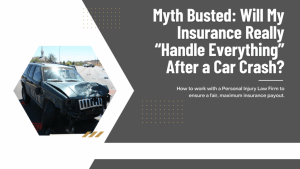Experiencing a car accident is disorienting enough without the added stress of navigating insurance claims. Many people operate under the common misconception that after a crash, their insurance company will simply “handle everything,” ensuring they receive fair compensation for damages and injuries. However, as McMullin Injury Law in St. George, Utah, often explains, this widely held belief is actually a myth that can lead to significant financial and legal challenges for accident victims.
The Truth About Insurance Companies
It’s crucial to understand a fundamental principle: insurance companies are businesses. Like any business, their primary goal is to turn a profit. They achieve this, in part, by minimizing the amount they pay out in claims. While the representatives you speak with may be kind and helpful, their job—and the company’s bottom line—depends on settling claims for the lowest possible amount. This perspective is a stark contrast to the expectation that your insurance will “Handle Everything” after a car crash? In reality, they are handling everything for themselves.
The insurance adjusters you’ll encounter are often genuinely nice people who want to help, but they work within a system designed to protect the company’s financial interests. They are trained to use specific tactics to reduce claim values, including offering quick settlements before you fully understand the extent of your injuries, requesting recorded statements that can be used against you later, and downplaying the severity of your damages.
Common Insurance Company Tactics That Hurt Your Claim
Understanding how insurance companies operate can help you protect yourself from common pitfalls. Here are several tactics they frequently employ:
1. Quick Settlement Offers: Insurance companies often present initial settlement offers within days of an accident, before you’ve had time to fully assess your injuries or understand the long-term impact of the crash. These early offers are typically far below what your claim is actually worth, but they’re designed to seem generous when you’re facing immediate medical bills and vehicle repairs.
2. Requesting Recorded Statements: Adjusters will often ask for recorded statements about the accident, claiming it’s just routine paperwork. However, these recordings can be carefully analyzed and used to find inconsistencies or statements that might reduce your claim’s value. You are not legally required to provide a recorded statement to the other party’s insurance company.
3. Minimizing Injuries: Insurance companies may suggest that your injuries are pre-existing, not as severe as claimed, or unrelated to the accident. They might pressure you to accept that your injuries will heal quickly without considering potential long-term complications or the need for ongoing treatment.
4. Surveillance and Social Media Monitoring: In more significant cases, insurance companies may conduct surveillance or monitor your social media accounts looking for evidence that contradicts your injury claims. A photo of you smiling at a family gathering could be taken out of context to suggest you’re not really suffering from the injuries you’ve claimed.
Understanding Utah’s Insurance Laws
Utah operates under a no-fault insurance system, which means your own insurance company will initially cover your medical expenses and lost wages regardless of who caused the accident. However, this coverage has limits, and for serious injuries, you may need to file a claim against the at-fault driver’s insurance company. Understanding these nuances is crucial for ensuring you receive appropriate compensation.
Utah law also establishes specific timelines for filing claims and pursuing legal action. The statute of limitations for personal injury claims in Utah is generally four years from the date of the accident, but insurance claims have much shorter deadlines. Missing these deadlines can result in the loss of your right to compensation.
What an Attorney Actually Does for Your Case
This profit-driven approach means that when you are the claimant, your interests and the insurance company’s interests are fundamentally opposed. In asking ‘will my insurance really handle everything after a car crash,’ they are not incentivized to offer you the maximum compensation. This is precisely why an experienced personal injury attorney becomes an essential advocate. Many accident victims wonder what exactly an attorney will do that they can’t handle themselves. Here’s what legal representation provides:
1. Thorough Case Investigation: Attorneys conduct comprehensive investigations, gathering police reports, medical records, witness statements, and sometimes hiring accident reconstruction experts to build the strongest possible case.
2. Accurate Claim Valuation: Experienced attorneys know how to properly calculate the full value of your claim, including current and future medical expenses, lost wages, pain and suffering, and other damages you might not have considered.
3. Professional Negotiation: Insurance companies take attorneys seriously because they know lawyers understand the law and are prepared to go to trial if necessary. This often results in significantly higher settlement offers.
4. Protection from Mistakes: Attorneys prevent you from making costly errors, such as accepting inadequate settlements, missing important deadlines, or saying something that could hurt your case.
When to Contact an Attorney
While not every minor fender-bender requires legal representation, you should strongly consider contacting an attorney if:
- Anyone was injured in the accident
- There are disputes about fault
- The insurance company is offering a settlement that seems insufficient
- Your injuries require ongoing medical treatment
- You’ve missed significant time from work
- The insurance company is delaying or denying your claim
Don’t Navigate the Aftermath Alone
Without legal representation, you might unknowingly accept a settlement that is far less than what you need to cover your recovery and losses. An attorney ensures that you are protected, informed, and empowered throughout the entire process. They handle the negotiations, paperwork, and legal complexities, allowing you to focus on what truly matters: your health and recovery.
Remember, most personal injury attorneys work on a contingency fee basis, meaning you don’t pay attorney fees unless they successfully recover compensation for you. This arrangement ensures that quality legal representation is accessible regardless of your financial situation after an accident.
Contact McMullin Injury Law today for a free consultation to understand your rights and ensure you get the compensation you are rightfully owed.
Video Transcript
So, we’re going to do some personal injury myth busting. I’m from St. George. There’s a lot of misconceptions about personal injury law, personal injury lawyers here locally. And so, I want to tackle one of those today. One of the things that I hear a lot from friends and family, is that after a car accident my insurance will handle everything. They’ll take care of everything. And they will handle everything for themselves, though. So, an insurance company, it’s a company, right? They turn a profit by not giving that same money to you. Therefore, their job is to minimize claims of what they need to pay out. It’s not because they’re bad. They’re probably the nicest, sweetest people you’d ever want to meet. But their job is to minimize what they pay out to you.
When you’re the claimant, suddenly you know that’s the exact opposite. My insurance will take care of everything is the exact opposite of what truth is. The truth is your insurance company will take care of themselves and they will pay out claims they have to. That’s why an attorney is needed, because you don’t know what insurance has to pay out, and how to ensure they pay out what’s right. That’s what we do all day, every day for people here in southern Utah. We stand on your team and make sure that the insurance company pays out what Utah law says is right and is fair, whether the insurance wants to pay that amount or not.



